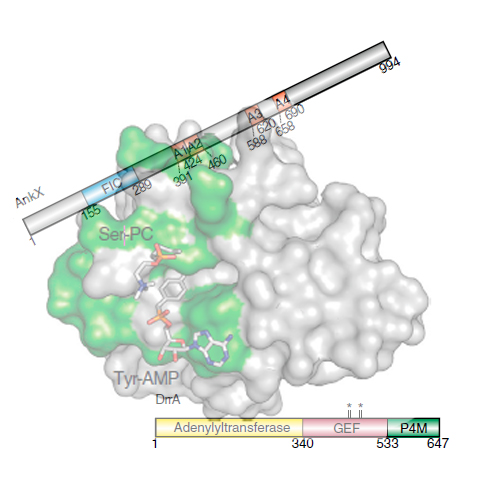Posttranslational modifications of Rab proteins cause effective displacement of GDP dissociation inhibitor
10-Apr-2012
PNAS, 2012, doi: 10.1073/pnas.1121161109, vol. 109 no. 15 5621-5626 published on 10.04.2012
PNAS, online article
PNAS, online article
Intracellular vesicular trafficking is regulated by approximately 60 members of the Rab subfamily of small Ras-like GDP/GTP binding proteins. Rab proteins cycle between inactive and active states as well as between cytosolic and membrane bound forms. Membrane extraction/delivery and cytosolic distribution of Rabs is mediated by interaction with the protein GDP dissociation inhibitor (GDI) that binds to prenylated inactive (GDP-bound) Rab proteins. Because the Rab:GDP:GDI complex is of high affinity, the question arises of how GDI can be displaced efficiently from Rab protein in order to allow the necessary recruitment of the Rab to its specific target membrane. While there is strong evidence that DrrA, as a bacterially encoded GDP/GTP exchange factor, contributes to this event, we show here that posttranslational modifications of Rabs can also modulate the affinity for GDI and thus cause effective displacement of GDI from Rab:GDI complexes. These activities have been found associated with the phosphocholination and adenylylation activities of the enzymes AnkX and DrrA/SidM, respectively, from the pathogenic bacterium Legionella pneumophila. Both modifications occur after spontaneous dissociation of Rab:GDI complexes within their natural equilibrium. Therefore, the effective GDI displacement that is observed is caused by inhibition of reformation of Rab:GDI complexes. Interestingly, in contrast to adenylylation by DrrA, AnkX can covalently modify inactive Rabs with high catalytic efficiency even when GDP is bound to the GTPase and hence can inhibit binding of GDI to Rab:GDP complexes. We therefore speculate that human cells could employ similar mechanisms in the absence of infection to effectively displace Rabs from GDI.











